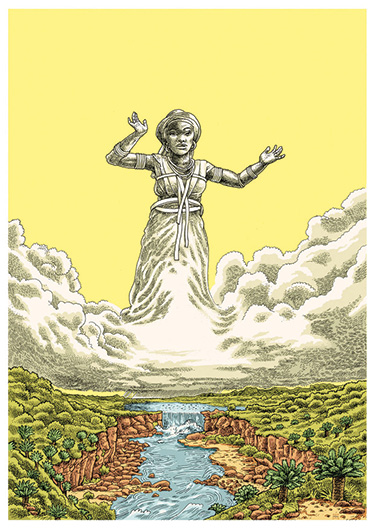 In all religions and cultures, there’s the belief of a specific deity behind the rains. In the Vedic tradition, yagnas are performed to invoke the rain-God. In our Zoroastrianism, we invoke Teshtar Tir Yazad. Similarly, while we were touring South Africa, a few years ago, a lady who was a mystic, told us about a spiritual rain queen which I’ll share with the readers today. The entire account isn’t available in a single book, but some light is thrown on her in South African folk tales – part true or part myth – either ways, a great story!
In all religions and cultures, there’s the belief of a specific deity behind the rains. In the Vedic tradition, yagnas are performed to invoke the rain-God. In our Zoroastrianism, we invoke Teshtar Tir Yazad. Similarly, while we were touring South Africa, a few years ago, a lady who was a mystic, told us about a spiritual rain queen which I’ll share with the readers today. The entire account isn’t available in a single book, but some light is thrown on her in South African folk tales – part true or part myth – either ways, a great story!
The vision of a few who saw her was that of a slender, dark-robed young woman silhouetted against a starry night. Standing upon a hill, head back, emerald-eyed sceptre in outstretched hands, she commanded the rain to come. It came and if it was her wish that the rain should stay away, it stayed! She dominated a vast region of warrior tribes, yet had not one soldier under her command. The mightiest of Chiefs obeyed her every wish. She had white skin and blue eyes. She was ageless and beautiful and at least 100 years old when she disappeared.
All this defies reason. Is this real or just a legend? Millions in Africa believe it’s true. The famous English author, H. Rider Haggard, has written an African classic, ‘SHE’, which was later made into a Hollywood film. Though the book and the film are certainly not based on her, there are similarities. The saga of the Rain Queen begins with her birth in a Bedouin caravan camp on the southern fringes of the Sahara Desert. This event, a little over three hundred years ago, was marked by a torrential rain storm in the dry Sahara Desert. Rain had hardly ever fallen there before. Even more remarkable was the fact that the child had pure white skin and eyes of the deepest blue. She was named Shareen.
Shareen was barely a teenager when when the camel train, which her father drove, was ambushed by a band of Bakwebo warriors. The caravan was looted and everyone on it slaughtered, except Shareen, who was made another of the Chief’s many wives. Less than a year later, the Chief mysteriously died. Shareen, now renamed Mujaji, became the senior wife of the new Chief. But very shortly, even the new husband died for unknown reasons, and she became the Chief of the Bakwebo people. She bestowed a new title upon herself – ‘She who must be obeyed’.
She ruled the Bakwebo people for over 80 years, as her influence spread over an immense area. She was known far and wide as ‘The Transformer of the Clouds.’ During this time, Central Africa erupted in turmoil, triggering millions to migrate southward.
The Bakwebo people of the Rain Queen were among them but by that time they had lost their fighting strength. The journey may have lasted ten to thirty years. The route taken by the Bakwebo led them to their new settlement in Wolowedu Mountains of South Africa’s Transvaal State. Mujaji chose to live on the solitary mountain, Levanga, where her influence and power were felt by her neighbours – powerful tribes, far greater in number and wealth, possessing well-equipped armies. Mujaji hardly had fighting men amongst her 5,000 people but she didn’t need the protection as her weapon was her control of the clouds.
The adjoining kingdoms – Tsonga, Venda Sotho, Pedi, Swazi and Tswana – soon understood the awful consequences of confronting Mujaji – drought! To appease and gain her favours of rain, her neighbours brought an endless stream of gifts – gold, cattle and young girls of royal birth – a kind of insurance so should, whatever reason, her powers desert her, her warlike neighbours would not attack while their King’s and Chief’s daughters were with Mujaji! So, gifts flowed and the Bakwebo people assumed the new name, ‘Lovdu – the Palace of Offering’. Although wars raged through the region, the land of Lovdu was never touched. There was no leader, no matter how mighty, who could risk the displeasure of the Great Transformer.
When her power was at its greatest, it suddenly ended. White men arrived in South Africa with their modern weapons, wars for supremacy engulfed the region. The white soldiers, disdainful of Mujaji’s reputed powers, overran Lovdu. The royal handmaidens were still there when the soldiers stormed into the palace, but there was no sign of Mujaji and she hasn’t been seen since! She just disappeared into thin air – as mysteriously as she had arrived!
- The Real Beauty Secret - 13 April2024
- Frenymai And The Fake Godman – II - 30 March2024
- Meherbai’s Mandli Discusses Coomi Kaajwali’s Match-Making Secrets! - 16 March2024
